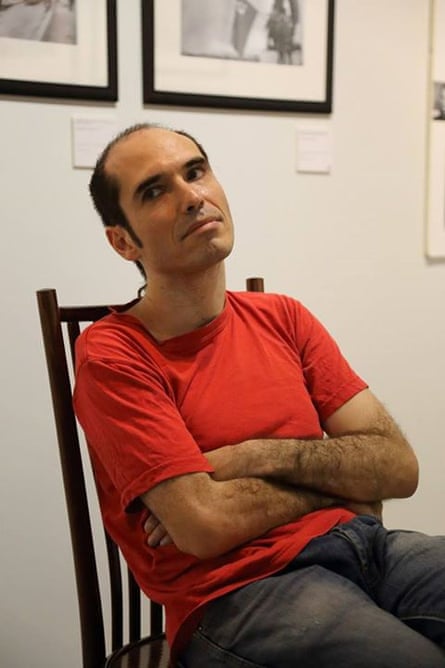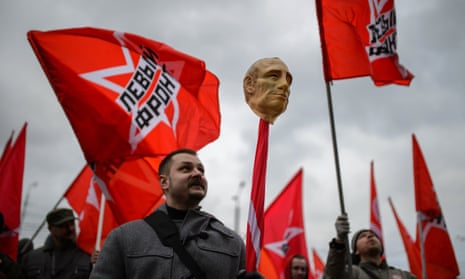I gave up copyright in my own work in 2004. I had become increasingly disgusted by the situation in my country. But my interpretation of the problem ran counter to the anti-Soviet, dissident one favoured by most of the Russian intelligentsia. I believed that the problem we were facing wasn’t a return to the Soviet Union, but rather the fact that Russia was once again finding its place in the capitalist world system, adapting, in its semi-peripheral way, the main tendencies of that system. Without reflecting on and criticising these tendencies, it seemed impossible to have a genuine position on Putin’s Russia; it seemed impossible to be a political or civic artist.
The international movements that interested me at that time, with which I felt solidarity – the alterna-globalisation movement and the movement against the invasion of Iraq – were simply nonsense to the liberal intellectual circles to which I belonged. I saw in this our extreme provincialism, one that I wanted to break out of even as I maintained my ties to the Russian revolutionary-democratic and Soviet underground traditions which I felt were my inheritance. Osip Mandelstam once defined acmeism, the poetic movement to which he belonged, as a “yearning for world culture”. I think my rejection of copyright at that moment, my decision to release my work on to the internet without any claim of ownership, was a similar gesture of yearning for the international progressive intellectual, artistic and political movement that seeks a way out of neoliberal capitalism.
I was already becoming known as a poet, and I also wrote articles on social themes, but at the same time I was increasingly aware of the fact that in order to make a political statement an artist must not merely work with “political” themes in his poetry, that is, on the level of content, but must also develop a structural, institutional alternative to the existing order. What I didn’t understand at the time was something else: that this alternative should not be an escapist one, an exit into a parallel, underground, subcultural space, but rather a flexible, open, occasionally provocative, but, mainly, independent, true to yourself and your ideas, alternative within the larger, general, social space. And how to find this way of being – this is the main political question that must be addressed by any politically engaged artist, publisher, activist, radical politician; by anyone who seeks, on the one hand, to find a more or less large audience and to address universal themes, but who refuses, on the other hand, to acquiesce to the current economic, aesthetic or ethical system.
To be on the edge of the mainstream and the underground, maintaining independence from both while reflecting and reinterpreting both concepts; to poke and prod and find the weak spots in the current system of the production and distribution of information (as well as the ethical concepts that have risen around this system) while resisting being entirely co-opted by it – experiments on this border will be the essence of radical politics and art for the foreseeable portion of historical time.
I came to all these ideas gradually. My initial rejection of copyright was more of an emotional gesture, a step into the abyss caused by the total absence, as it seemed to me at the time, of political and artistic allies. It was a step into the abyss that eventually allowed me to find a new path.
I have now had five books published without copyright in five different countries – Russia, Estonia, the US, Holland, and England. In the first case I only learned of the book’s publication after it had already occurred, in the other cases I knew in advance, but didn’t participate in the preparation of the book, and the publishers have been willing to follow the conditions set out in my manifesto on copyright.
Publishers who want to put out my book are forced to take on a certain responsibility that forces them out of the realm of professional publishing and into the realm of political and even ethical choices, if only because they have to decide whether to pay me. They are not contractually obliged to, since there is no contract.

I am of course glad that my books are being published. It confirms, among other things, my naive literary-centric belief that a work of art, if it really is one, is capable of making its own way in the world, overcoming the obstacles put in its path by, among other people, the author. It also confirms another of my ideas: that the artistic force of a work consists in its ability to propose practical questions that cannot be reduced to aesthetics, that force themselves outside the bounds of aesthetics.
I don’t consider my gesture a “great refusal”; as a small publisher and musician I am obviously connected in numerous ways to various people and insitutions. But, after all, commandments aren’t made so they can be fully carried out in all their particulars (this is, in any case, impossible), but so that new ways of keeping with their spirit can be discovered.
My five-year refusal to publish my poems at the same time as I felt an urgent need to speak out in public eventually led to the realisation that I will write poems even if I know that no one will see them in the next few years – and also, indirectly, to the creation of the folk-punk rock group Arkady Kots, where I am one of the lead singers.
What I’m describing here is a kind of search for sovereignty. In place of the illusion of freedom you can have within the neoliberal market, where you face numerous invisible but in fact (and for that reason) insurmountable obstacles, you create the obstacles yourself, at the right moment, limit your freedom on your own and thereby form an independent economy of relations as well as, in a way, creating your own norms for what freedom means.
Of course the question of publishing poetry and manifestos is unconnected with earning a living – you wouldn’t be able to earn a living that way in any case. If anyone’s curious, however, for several years I was a stay-at-home father; more recently I have worked as a delivery man for several companies as well as a freelance book editor.
Translated by Keith Gessen

Comments (…)
Sign in or create your Guardian account to join the discussion